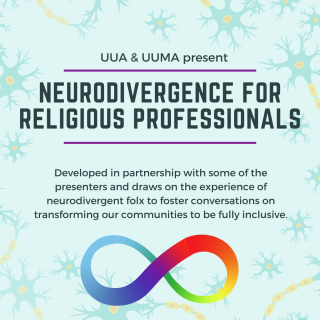Neurodivergence Class
Dismantling White Supremacy Culture Resource of the Month
Reverend Sharon K. Dittmar, Congregational Life Consultant

Overview
I recently participated in an online joint UUA/UUMA (UU Minister’s Association) class about neurodivergence. According to the article, Welcoming Neurodivergent Folx to Our Congregations, “Neurodivergence is a large category for all the ways people’s brains can be different from 'typical': ADHD, autism, dyslexia, dyscalculia, dyspraxia, dysgraphia, Tourette syndrome, C-PTSD, anxiety, traumatic brain injury, epilepsy, and more.”
Honestly, I am still living into the fullness of the definition of neurodivergent and what it could mean for myself and others. The class has three sessions and was for people like me who are looking for more information and understanding, as well as those who are neurodivergent, or who are already familiar with the topic.
Away From Medical Models
Something I enjoyed is that the sessions moved away from medical models of “health” towards categories (such as dysgraphia or depression) without any attached value. The sessions focused on what it is like to be neurodivergent (and the wide diversity in this definition), and how individuals and congregations can communicate about neurodivergence to create environments where everyone succeeds.
Towards Cultures of Conversation
I began to wonder how congregations can create cultures of conversation and trust where needs are continually shared. Speaker, Ramon Selove noted, “There are no best practices because people need different things.” He suggested creating multiple options and accommodations, while noting that accommodations can create conflicting needs which then need negotiated.
I have thought a lot about slowing down congregational conversations to listen better and make sure all feel included. This is a process of continual education. New people always enter our communities, so we are always coming to new understandings.
What Can I Do?
The sessions made me wonder how I can be flexible with others. I need to advocate for my needs, as well listen to other people share their needs (seems to be a bit of a life lesson here). For example, some people need to move to concentrate, some people need order to concentrate, and some people need minimal stimulation. All these people could all be at the same worship service. I am left wondering what conversations our congregations need to host and what options we need to offer to welcome all.
To Sign Up
All three sessions are available online for $15 each.

